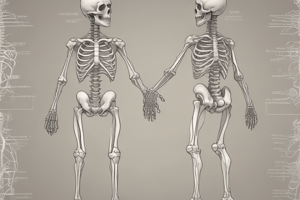Podcast
Questions and Answers
What is the main function of the vertebral column in vertebrates?
What is the main function of the vertebral column in vertebrates?
- To provide support and protection for the spinal cord (correct)
- To protect the brain
- To regulate body temperature
- To facilitate movement and locomotion
What is the main advantage of having bones over cartilage in vertebrates?
What is the main advantage of having bones over cartilage in vertebrates?
- Bones allow for more efficient respiration
- Bones provide better protection for organs (correct)
- Bones are more flexible than cartilage
- Bones are stronger than cartilage
What is the primary function of gills in fish?
What is the primary function of gills in fish?
- To absorb oxygen from water (correct)
- To maintain buoyancy
- To filter out food particles
- To regulate water pressure
Which of the following senses is unique to sharks?
Which of the following senses is unique to sharks?
What is the name of the organ that allows fish to maintain buoyancy?
What is the name of the organ that allows fish to maintain buoyancy?
Do sharks have a swim bladder?
Do sharks have a swim bladder?
Flashcards are hidden until you start studying
Study Notes
Vertebrates
- Vertebrate means an animal has a backbone.
- The vertebral column first evolved in fish and is the core of the endoskeleton (internal skeleton), housing and protecting the spinal cord.
Vertebral Column
- In many species, shock-absorbing discs cushion vertebrae.
- The endoskeleton is made up of cartilage or bone.
- Cartilage is a tough tissue that contains a protein called collagen.
- Bone is a hard tissue that consists of a collagen matrix with calcium.
- Bone is less flexible, but cartilage is stronger.
Fish
- Fish are aquatic vertebrates.
- They make up more than half of all vertebrate species.
- Scales protect fish from predators and parasites.
Adaptations for Water
- Gills allow water to enter the mouth, pass over the gills, and exit through an opening, absorbing oxygen.
- Fins are used for swimming.
- A system of muscles is used for movement.
- Swim-bladder is a balloon-like organ that contains gas, allowing fish to float and have buoyancy.
Fish Organ Systems
- Fish have a circulatory system with a two-chambered heart.
- They have a digestive system with several organs and glands.
- They have a central nervous system with a brain and sensory organs.
Shark Specifics
- Sharks can sense low levels of electricity emitted by their prey.
- Sharks do not have a swim-bladder.
- Sharks do not have bones, only cartilage.
- Sharks have a two-chambered heart.
- Male sharks have claspers on the outside of the body for sperm production.
- Sharks have lots of oil in the body, which is lighter than water, helping them float.
Studying That Suits You
Use AI to generate personalized quizzes and flashcards to suit your learning preferences.




